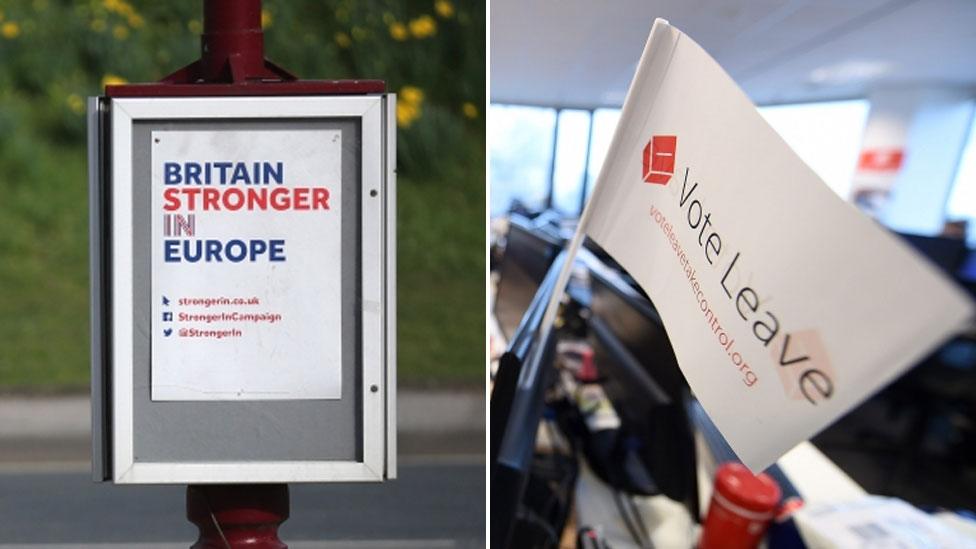The people hoping to persuade UK to vote to leave the EU
- Published
Meet the men and women who have been given the job of persuading Britain to leave the European Union in 23 June's referendum.

What is Vote Leave?
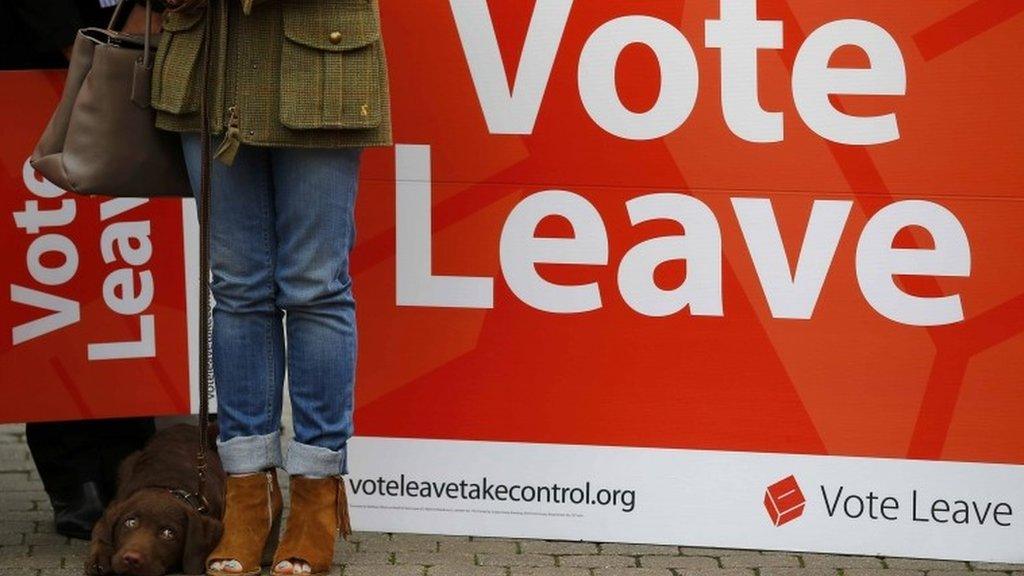
It is the organisation that has been chosen by the Electoral Commission to take the lead in making the case for Britain to leave the European Union. Although most of the big names at the head of the campaign are all Conservatives it has prominent Labour, Lib Dem and UKIP figures too, as well as business people.
Dozens of other organisations - including UKIP and leave.EU - have also been making their views known.
But only Vote Leave has been given £600,000 in public funds - to pay for a free mailshot to every household in the UK and to put on TV broadcasts - and only Vote Leave is allowed to spend up to £7m of money it has raised. Other anti-EU groups have been restricted to spending £700,000, and there are quite a lot of them (there are about 14 groups under the Grassroots Out banner alone).

What does it do?
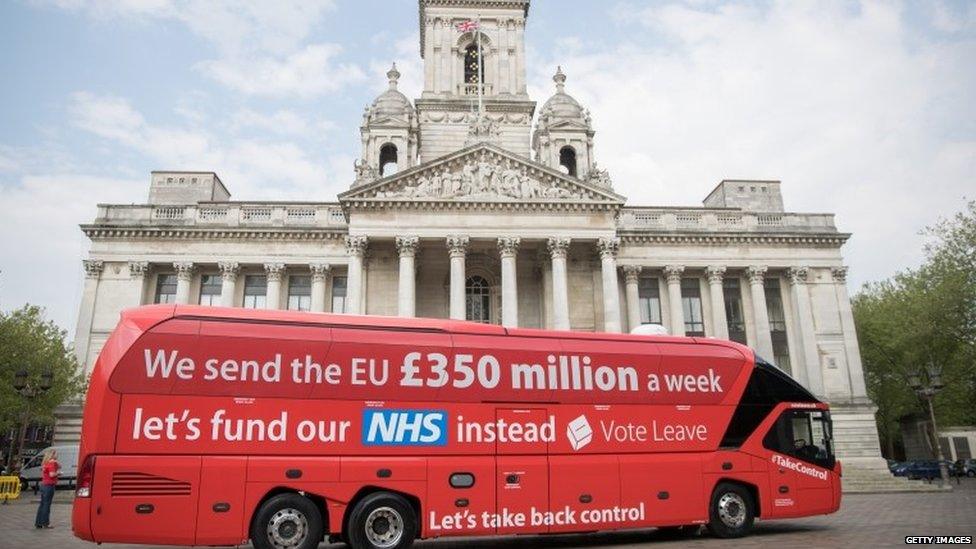
Vote Leave has played a crucial role in shaping the referendum debate.
It has aimed to win over wavering voters in the centre ground by arguing that Britain can take back control of its own destiny and that leaving the EU will free up money to spend on the NHS and other public services.
Its opponents have accused it of failing to make a convincing economic case for Brexit and falling back on arguments over immigration. It has set out plans for a Australian-style migration points system to curb EU migration - an approach long endorsed by UKIP.
It is a Westminster-based group but it has a network of grassroots supporters and has a growing list of affiliated groups, including Veterans for Britain, Muslims for Britain, Aussies for Britain, Out and Proud (an LBGT group), and even Vapers for Britain, who are campaigning against EU regulation of e-cigarettes.

Who funds it?
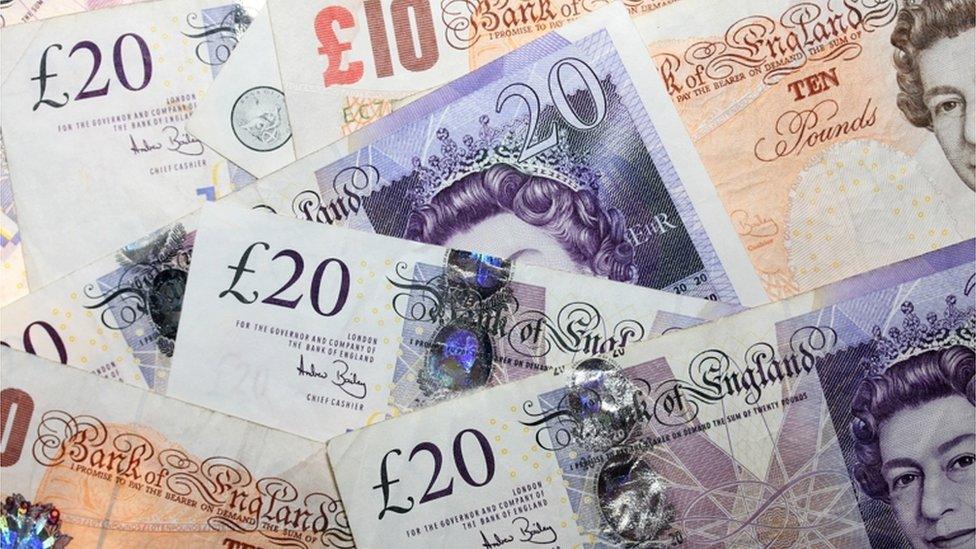
City millionaire and Conservative donor Peter Cruddas, Stuart Wheeler, a Conservative-turned-UKIP donor and businessman Patrick Barbour are among those to have put money into Vote Leave.
Other backers include former Conservative treasurer and Dixons boss Lord Kalms, Christopher Foyle, the chairman of Foyles bookshop, Joe Foster, the founder of Reebok, and John Caudwell, a philanthropist and co-founder of Phones4U, are among its other business backers.
The rival Leave.EU campaign has received a single £3.2m donation from stockbroker Peter Hargreaves while Grassroots Out, which is affiliated to Leave.EU, was given £1.95m by Better for the Country, a company with links to Leave.EU founder Arron Banks.

The key players
This is the group that has met every day during the campaign to plot strategy and decide on the messages to put out to the media.
Michael Gove - Conservative cabinet minister
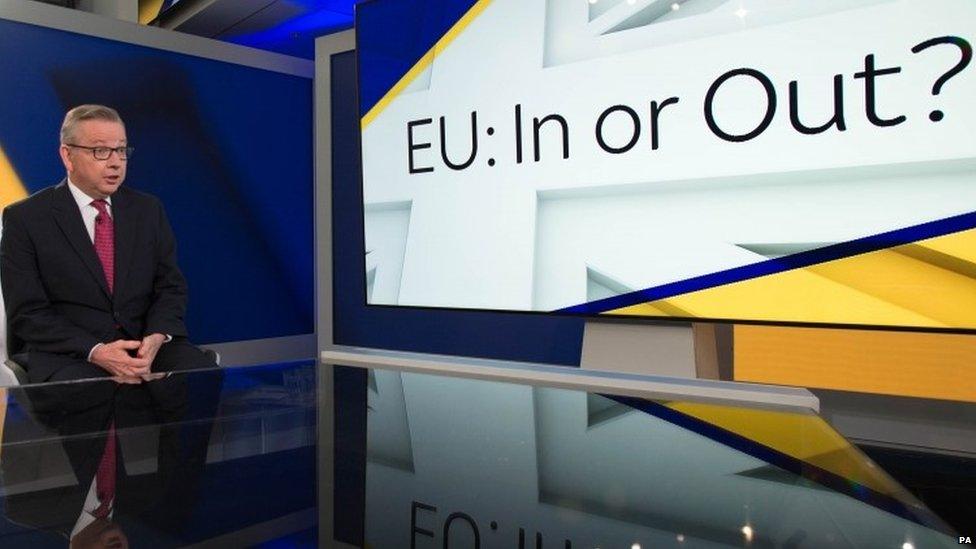
As one of the cabinet's big hitters and a close friend of the prime minister, Gove was a crucial signing for Vote Leave. A longstanding opponent of Britain's membership of the EU, who kept his views to himself until the referendum date was announced, the justice secretary is the joint head of the Vote Leave campaign.
He has spoken of how his views on the EU were shaped by the collapse of his father's fishing business in the 1970s, for which his family blame the EU's Commons Fisheries Policy.
He represented Leave in the Sky EU referendum special and will appear on the BBC's Question Time special.
Gisela Stuart - Labour MP
One of a small group of Labour MPs opposed to Britain's membership of the EU, the German-born Stuart replaced former Conservative chancellor Lord Lawson as co-chair Vote Leave, as the group sought to prove it had cross-party support.
A widely-respected figure in the Commons, she has been MP for Birmingham Edgbaston since 1997 and was one of the British MPs delegated to help draw up an EU constitution, an experience that helped convince her Britain should leave.
She has spent much of the campaign touring the UK with Boris Johnson in Vote Leave's battle bus.
Boris Johnson - London mayor and Conservative MP
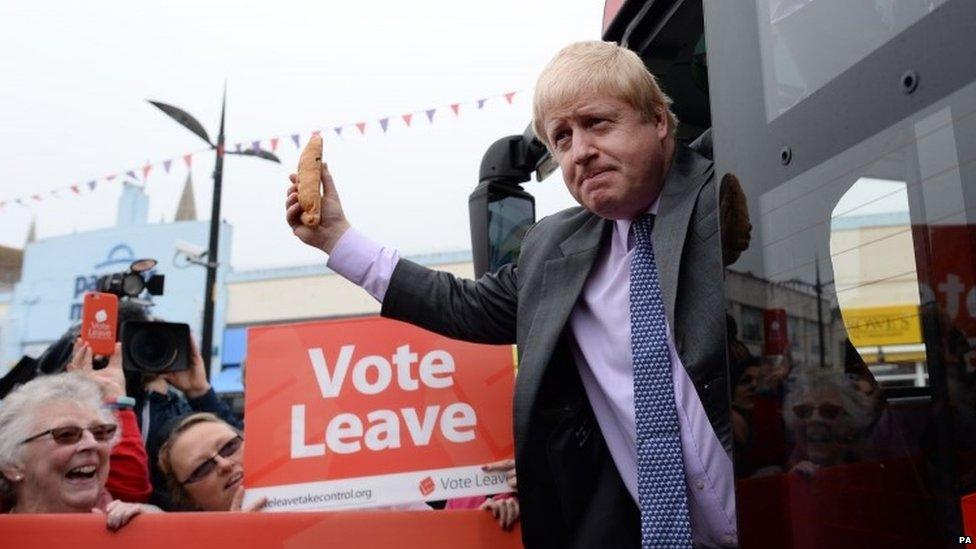
Johnson's decision to join the Vote Leave cause was seen as a potential game changer by the group's leaders. He has ruled out a head-to-head TV debate with David Cameron, the man he one day hopes to replace as Conservative leader, but he has spent much of the campaign on the road pressing the flesh and denouncing Remain arguments in his trademark "unpolished" style.
During an ITV debate, he was accused by ministerial colleague Amber Rudd of putting personal ambition ahead of principle - leading to speculation he was being targeted by the Remain camp.
Matthew Elliot - chief executive
The bespectacled 38-year-old is seen as one of the most effective lobbyists at Westminster. Best known as the founder of the pressure group The Taxpayers Alliance, he also ran the successful 'No2AV' campaign in the referendum on reform of the voting system in 2011. He is assisted by Stephen Parkinson who left his job as one of Theresa May's special advisors to join the campaign.
Dominic Cummings - campaign director
Cummings cut his campaigning teeth in his native North-East, as part of the successful campaign against a regional assembly, in a 2004 referendum. His blunt, uncompromising style has put noses out of joint in the past, particularly during his spell as a special adviser to Michael Gove when he was education secretary, but he is seen by supporters as a clever, original thinker.
John Longworth - businessman
Although a number of high-profile business figures - including James Dyson and Sir Anthony Bamford - have backed Brexit, they have been outnumbered by those seeking a Remain vote. Mr Longworth, who left his job as British Chambers of Commerce chief executive over his EU views, has been deployed to counter their arguments and make the case for why UK firms will thrive outside the single market.

Other Key Vote Leave figures
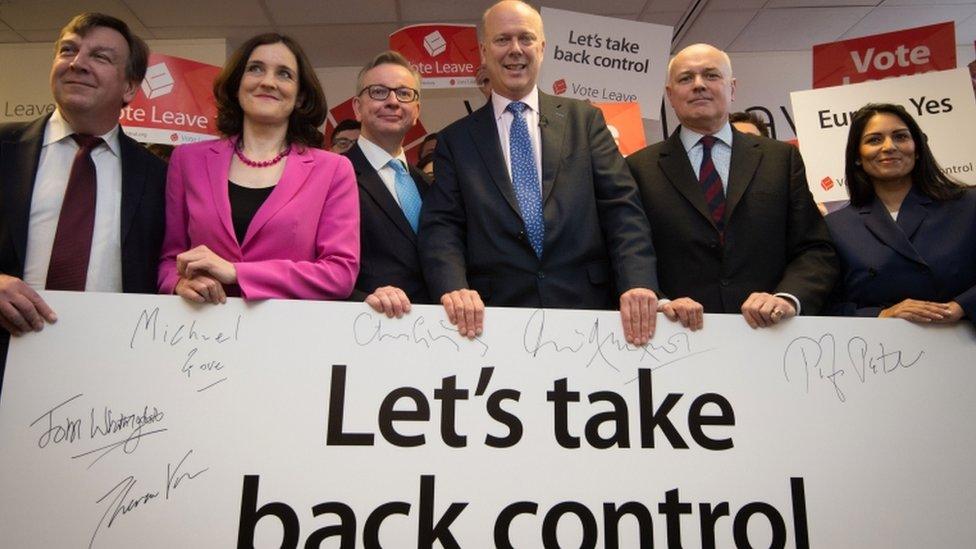
John Whittingdale, Theresa Villiers, Michael Gove, Chris Grayling, Iain Duncan Smith and Priti Patel
Former Work and Pensions Secretary Iain Duncan Smith, who resigned from the cabinet in March, has been the most vociferous Conservative grandee backing Brexit - accusing the government of abusing its position and scaremongering.
Cabinet Ministers John Whittingdale, Theresa Villiers and Chris Grayling - and Priti Patel who attends cabinet - have also been in the frontline while ministers Penny Mordaunt and Andrea Leadsom have made high-profile interventions.
Former Conservative Chancellor Lord Lawson is on the board of Vote Leave, along with home shopping magnate and Labour donor John Mills. Former Labour foreign secretary and SDP founder Lord Owen is also playing a high profile role.
UKIP spokeswoman Suzanne Evans - currently suspended from the party after a row - and former Lib Dem MP Paul Keetch have also figured, along with UKIP MP Douglas Carswell.

What about Nigel Farage?
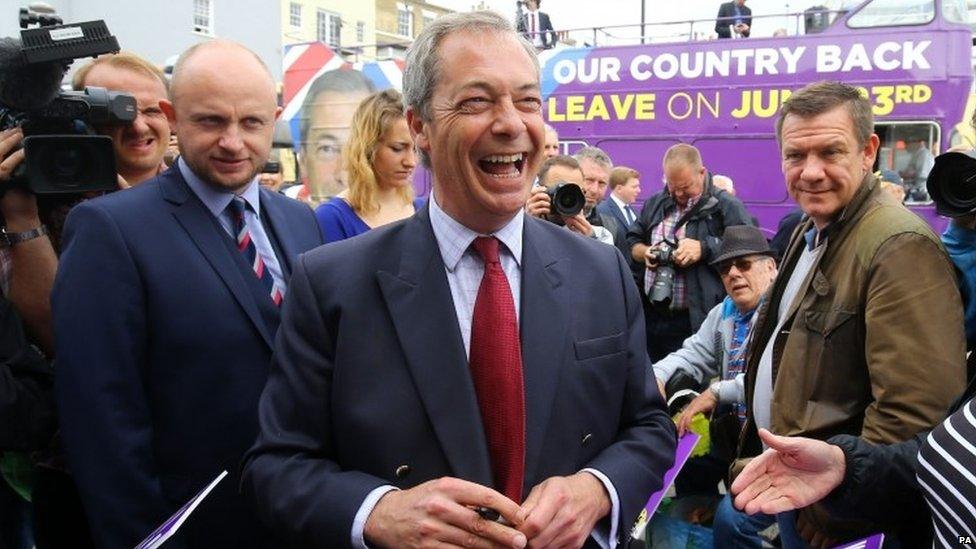
The UKIP leader is the face of Euroscepticism in the UK and did as much as anybody to secure a referendum in the first place.
He is a leading member of the Grassroots Out group, which lost out to Vote Leave in the battle to become the official Leave campaign - but that does not mean he has taken a back seat.
The UKIP leader has been ferried around the country in his own battle bus and has taken on David Cameron in an ITV debate - although the two men did not appear on stage at the same time.
Although he has shared a platform with some Conservative Brexiteers, relations with Vote Leave have remained frosty and he has accused them of trying to airbrush him out of the picture. He has welcomed what he claimed was Vote Leave's endorsement of UKIP's immigration policy.
- Published13 April 2016
